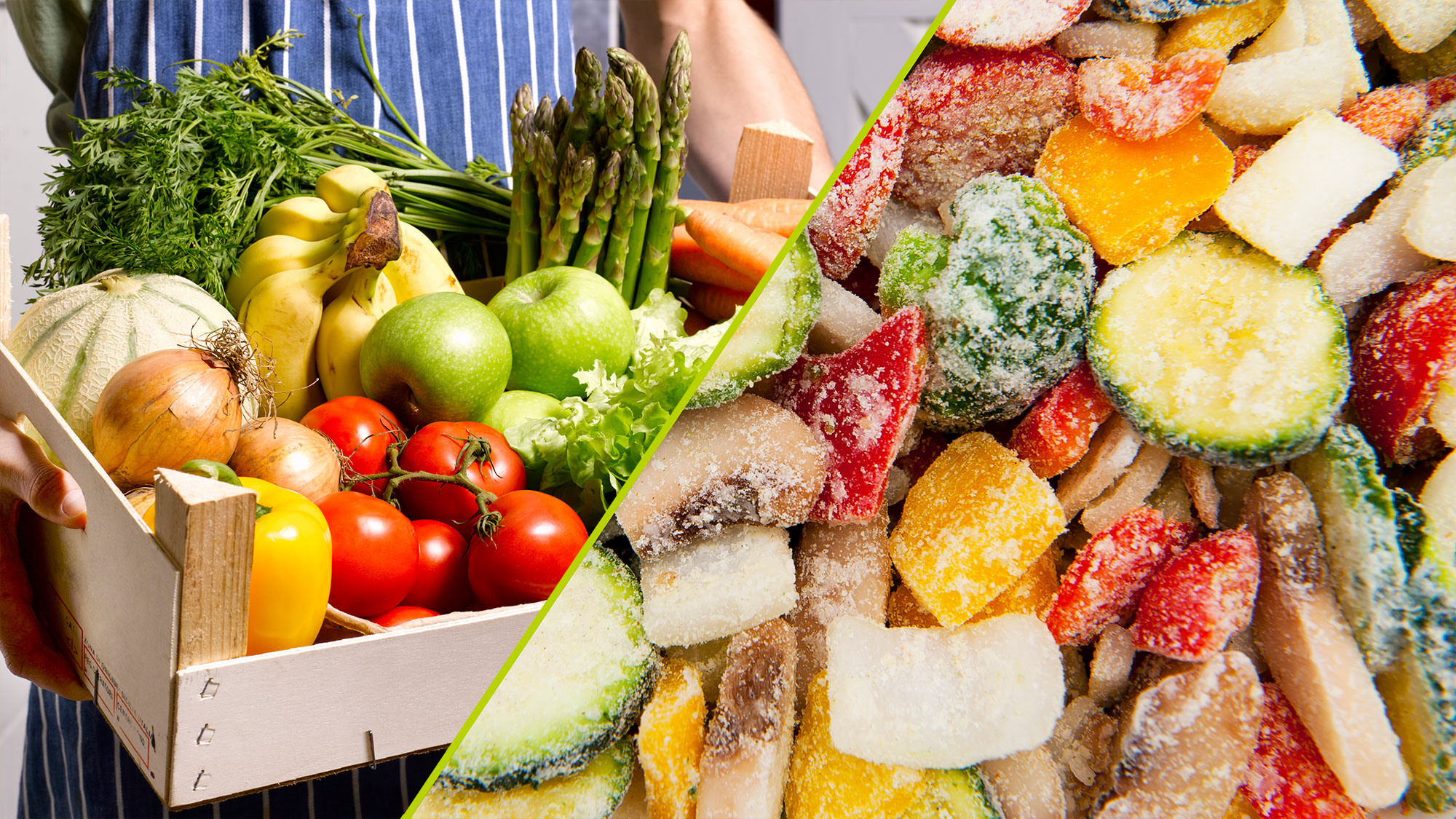
If you've ever wondered if frozen vegetables are healthy, then we're here to help you figure out what's best when it comes to frozen vs fresh foods.
Frozen fruit and veg is convenient and good value, two key components people often look for when trying to figure out how to eat healthily. Frozen fruits can be tossed into your best blender to whip up a delicious smoothie, whilst frozen veg can be added directly to many dishes during cooking, saving on preparation time.
Despite this, frozen food is often forgotten when we come to buy our fruit and vegetables. But, says performance and clinical dietician Renee McDonald, ‘Fresh definitely isn’t always best.’
Frozen vs fresh: the case for healthy frozen food
She's backed up by research at the Centre for Food Innovation at Sheffield Hallam University tested 37 varieties of produce and found no nutritional difference between the frozen and fresh items.
And according to Brian Young, former chief executive of the British Frozen Food Federation (BFFF), freezing actually preserves vitamins and minerals. In contrast, most fresh food has a useful nutritional lifespan of only five days at most. For example, 77% of vitamin C in a green bean is lost during seven days of storage.
It can also take ‘fresh’ fruit and veg up to two weeks to reach your local supermarket. In that time nutrients escape because of exposure to heat, light and oxygen.
Once you get your produce home, how you store it affects its nutritional value, too. ‘Exposure to light causes one of the biggest problems in most produce,’ says Renee. ‘It causes a chemical reaction in the skin that damages the cell walls where the nutrients are stored, allowing them to escape. Plus, every time you chop or slice a fruit or vegetable it loses nutrients. This happens due to exposure to oxygen in the air.’
Start your week with achievable workout ideas, health tips and wellbeing advice in your inbox.
So how does the freezing process work? Fruit and vegetables are picked when ripe, then undergo a process called blanching, which involves a blast of hot water or steam, and then they’re frozen. Blanching does zap some of the nutrients, particularly water-soluble vitamins C and B, but it stops the produce from going brown and losing further nutrients.
Healthy frozen fruit and vegetables
The answer to the question 'are frozen foods healthy?' is yes in the case of the following types of fruit and vegetables:
- Broccoli
- Strawberries
- Green peas
- Sweetcorn
- Broad beans
- Mango
- Pineapple
- Cherries
- Grapes
- Berries
- Melon
- Peaches
When it comes to broccoli, strawberries, green peas and sweetcorn, studies have shown that these fruit and veg all contain more vitamin C than fresh, refrigerated samples.
Meanwhile, research has shown that anthocyanin flavonoids – the compounds that have antioxidant health properties – survive freezing well and score higher in terms of antioxidants than fresh fruit in the case of mangoes, pineapples, cherries, grapes, berries, melon and peaches.
With broad beans, the outer skin helps preserve the kernel’s nutrients, whilst frozen peas have higher levels of beta carotene (which converts into vitamin A) than fresh when cooked.
Fruit and vegetables best consumed fresh
The following fruit and veg are best bought and consumed fresh in order to maximize their health benefits:
- Carrots
- Courgettes
- Onions
- Cucumber
- Spinach
- Bananas
- Tomatoes
The cold does bother these veggies. In the case of carrots, courgettes, onions and cucumber, their 90% water content means ice crystals form when they’re frozen, which changes their cellular structure, affecting nutrient content and taste.
Meanwhile, spinach loses its vitamin C content when frozen. This is thought to happen when it’s being chopped for blanching, as its large surface area allows the vitamin C to seep out.
Despite noting earlier that exposure to light can lead to loss of nutrients, in some cases light exposure is actually beneficial. This is true of bananas; when bananas ripen and go brown through exposure to light, their nutrient content becomes richer, in terms of carbs and sugar content. So for a pre-training snack, opt for brown bananas!
Tomatoes also ripen when exposed to light. The redder they are, the more of the phytochemical lycopene they develop, which is proven to be a powerful antioxidant. It’s linked with a lowered stroke risk and reduced asthma symptoms.
It's worth noting here however that tinned tomatoes have more lycopene than fresh ones, and cooking boosts this level further still.
Frozen vs fresh foods: a note about cooking methods
Whether you opt for fresh or frozen, a key factor in retaining health-giving nutrients is the way that you cook your food, vegetables in particular. Options include boiling, steaming and stir-frying.
Boiling is the least healthy choice when it comes to preparing veggies, with Renee advising: 'If you boil your veg to death, you lose the water-soluble vitamins.'
Steaming is generally a better option. ‘Steam your veg or put them in the microwave with a little water (about a third of the way up your veggies) until they’re just warmed through,' advises Renee. Take a look at our pick of the best steamers to get started.
However, stir-frying is the best way to retain most nutrients when cooking vegetables, according to Renee. 'Cook veg in rapeseed oil,' she says. 'If it stays crunchy, you feel like you’re ‘eating’ your veg.’
Frozen vs fresh foods: final thoughts
‘Eat the rainbow’ is the latest mantra when it comes to a healthy plate of fruit and veg, which should contain all the colours of the rainbow. In the same way, you should have a mix of frozen and fresh too.
‘Frozen fruit is brilliant to throw into a smoothie, says Renee. 'Meanwhile, frozen veg is great for something simple like a frittata – it’s quick and easy, with no chopping involved,’ says Renee.
She adds: ‘Nutritionally, you could eat only frozen, but most people would struggle with storage and variety, so both is best.’
Words: Jo Willacy
Launched in 2020, Fit&Well.com is all about helping you meet your health and fitness goals in ways that are fun and achievable. With news and features on fitness, weight loss, running, nutrition, yoga, wellness and more, we're committed to helping you wherever you are on your fitness journey. We break down the best fitness tech, with reviews, buying guides and the latest deals on fitness and wellness kit, from dumbbells to diffusers.
We cater for all difficulty levels here. It doesn't matter if you're a beginner in the world of fitness or you're gearing up for your tenth marathon: we're all moving towards the same goal – creating a healthier, happier you. From guides on getting started doing walks around the block, to creating the perfect work-from-home space, to eating to fuel your first triathlon. It's all here.

